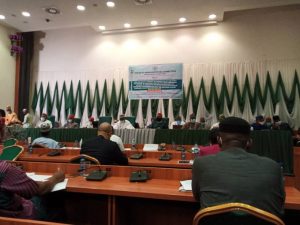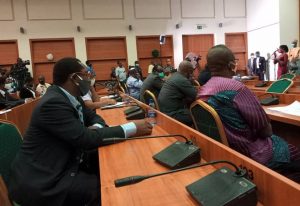Nigeria’s House of Representatives conducted a public hearing on the Control of Infectious Diseases Bill 2020 on Wednesday 10th and Thursday 11th June 2020 at the National Assembly Complex in Abuja, Nigeria. The bill, sponsored by Speaker of the Nigerian House of Representatives, Honorable Femi Gbajabiamila, seeks to strengthen the legal framework for disease surveillance and control by enlarging governmental powers to take a range of measures to prevent or respond to the outbreak of infectious diseases like COVID-19.
SPACES FOR CHANGE joined members of the human rights and civil society community to submit and present a legal memorandum to the federal lawmakers at the hearing. The memorandum which SPACES FOR CHANGE co-signed with 94 (ninety four) media, human rights and community organizations under the auspices of the Action Group on Free Civic Space disapproved of several provisions of the bill, and advocated for an urgent review.
Presenting the memorandum on behalf of the entire group, Kingsley Godwin of World Impact Development Foundation (WIDEF) submitted that numerous provisions of the bill infringe on constitutionally-protected rights and freedoms, especially the provision granting overreaching powers to health officials and the diseases control agency to stop any meeting or gathering that is ‘likely to increase the spread of an infectious disease, as well as the power given to law enforcement officers such as the police to apprehend people on the streets suspected of being carriers of an infectious disease. how will police officers determine that a person is suffering from an infectious disease? By mere physical observation? Or based on sound medical diagnosis?
Similarly concerning is the unparalleled power granted to the head of the national disease control agency to detain members of the public and minors, indefinitely, at a hospital or undisclosed locations if they are suspected to be a case or carrier of an infectious disease. The Action Group also disapproved of Sections 47 and 48 of the Bill which empower the head of the national disease control agency to order the compulsory vaccination of members of the public in order to prevent or contain a ‘suspected’ outbreak of a disease. The bill is silent on the need for informed consent prior to any vaccination. Furthermore, the bill imposes no obligation on the agency to inform members of the public of any health risks that may follow compulsory vaccinations. There is also no provision for legal responsibility for drug reaction or other negative side effects, especially where informed consent is neither sought nor obtained.
The views expressed by several stakeholders at the public hearing aligned with the Action Group’s submissions. For instance, the current Director-General (DG) of the Nigerian Center for Disease Control (NCDC), Dr. Chikwe Ihekweazu stated that the drafted Infectious Disease Bill apportioned too much power to the DG of NCDC. He joined the delegation of the Federal Ministry of Health at the public hearing to demand for a review of some sections of the bill.
Also representing the Nigerian Governors Forum, Governor Fayemi of Ekiti State raised concern about the diminishing role of states in the bill, in sharp contrast with the constitutional provisions which listed health as a concurrent priority of states and the federal government. Religious leaders, health experts, media organizations and a host of stakeholders joined also raised objections to the bill, citing numerous reasons. Following the tradition of the Nigerian parliament, Nigerians are optimistic that the current leadership of the lower house of the Nigerian legislature will heed the calls for restraint in the passage of the bill.






















